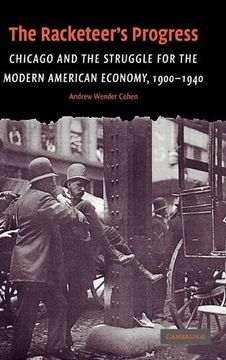Share
The Racketeer's Progress: Chicago and the Struggle for the Modern American Economy, 1900-1940 (Cambridge Historical Studies in American law and Society)
Andrew Wender Cohen (Author)
·
Cambridge University Press
· Hardcover
The Racketeer's Progress: Chicago and the Struggle for the Modern American Economy, 1900-1940 (Cambridge Historical Studies in American law and Society) - Andrew Wender Cohen
Choose the list to add your product or create one New List
✓ Product added successfully to the Wishlist.
Go to My Wishlists
Origin: Spain
(Import costs included in the price)
It will be shipped from our warehouse between
Thursday, June 06 and
Monday, June 17.
You will receive it anywhere in United Kingdom between 1 and 3 business days after shipment.
Synopsis "The Racketeer's Progress: Chicago and the Struggle for the Modern American Economy, 1900-1940 (Cambridge Historical Studies in American law and Society)"
The Racketeer's Progress explores the contested and contingent origins of the modern American economy by examining the violent resistance to its development. It explains how carpenters, teamsters, barbers, musicians and others organised to thwart ambitious national corporations. Unions and associations governed commerce through pickets, assaults and bombings. Scholars often ignore this defiance, painting modernisation as a consensual process and presenting craftsmen as reactionary, corrupt and criminal. This is ironic, for the tradesmen's reputation derives from their successful struggle to control modernisation and the emerging consumer economy. Their resistance redirected American law. Progressive-era courts rebuked the craftsmen for attempting to govern trade. In the 1920s, the tradesmen inspired new criminal concepts, such as 'racketeering'. But the Great Depression reversed harsh laws. The craftsmen became a model for New Deal recovery statutes and a focus for constitutional debates. Meanwhile, the state began protecting unions against gangsters like Al Capone.
- 0% (0)
- 0% (0)
- 0% (0)
- 0% (0)
- 0% (0)
All books in our catalog are Original.
The book is written in English.
The binding of this edition is Hardcover.
✓ Producto agregado correctamente al carro, Ir a Pagar.

